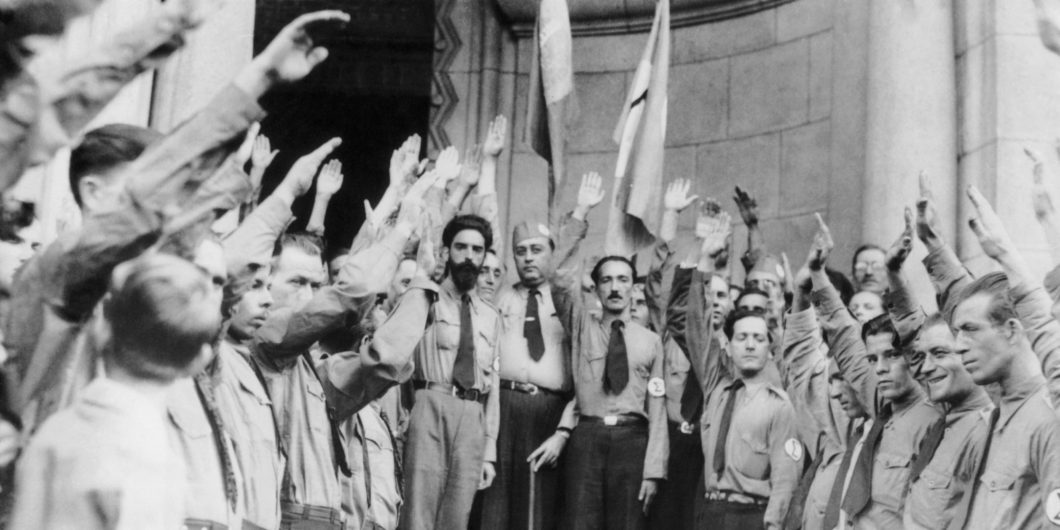Integralists will have to bite some hard bullets to maintain their position.
A Strawman and a Scotsman Walk into the Café de Flore
I would like to thank Nathan Pinkoski for his insight about some of the historical details to which I briefly referred early in my piece “After Republican Virtue.” The central claim of my essay was that neo-integralists today lack formation in republican institutions and therefore succumb to the tendency of democratic peoples to rely too much on general ideas both as a source and explanation for political problems. With respect to my claims concerning Tocqueville, republican virtue, neo-integralists falling prey to general ideas, the role of the sublime historical experience in generating interest in neo-integralism, and the importance of local parish life for promoting habits of self-government, Pinkoski does not object and therefore concedes.
The Sublime Historical Mix-up
Early in my essay, I briefly mentioned that, during the interwar years, Catholic integralists found themselves allying with fascist parties out of necessity. The specific language was the following:
Because they could not support liberal or socialist parties, Catholics felt cornered. Consequently, they often opted for reactionary “integralist” parties that promised some version of restored throne and altar politics and either became or made common cause with fascism.
The essay offered examples from Austria, Brazil, Portugal, France, and Spain. Because my interest was in discussing contemporary neo-integralists, I decided a lengthy digression on the historical details of these examples was unnecessary. After all, the essay was quite long already.
Pinkoski would have preferred me to have written another thousand words on these differences, and this demand is based off a misreading of my claim. He seems to think I equated fascism and integralism. I did not. I merely argued that fascists and integralists collaborated in a way that established a link between the two afterwards. In this respect, I was following the work of Roger Griffin, who explains, “collusion…was rarely between Catholicism and fascism as two utopian ideologies, since these were in principle incompatible…[r]ather it was between two rival, mutually hostile, institutional power centres each attempting to exert its influence over modern society” [emphasis in original]. When referring to how some integralist parties “became” (as opposed to “were” or “were the same as”) fascist parties, I was referring to the Austrian integralist and fascist parties uneasily combined into Engleburt Dolffuss’s Fatherland Front, the fascist foundations for Brazilian Integralist Action, and the convergence of Carlism and Falangism that transpired after Franco had stabilized his tyranny. As should be clear from the plain language of my historical claim, Pinkoski’s response is simply attacking a straw man. I did not argue that integralism and fascism were the same. Rather, I provided a brief narrative of how integralists and fascists ended up in alliances that had a lasting effect on integralists up to the present.
Moreover, Pinkoski concludes that his treatment of Spain and France disproved my claim. His declaration is unwarranted. First, his views on the two cases are, at best, incomplete, as I explain below. Second, Pinkoski only objected to two of the five examples I mentioned. Even if he were right about Spain and France, he still did not object to the inclusion of examples from Austria, Brazil, and Portugal. By granting me the remaining cases, he concedes them, meaning they are examples of integralist and fascist collaboration. After all, he had a chance to correct the record, but he demurred in favor of a discussion of European anti-republicanism and speculation about my allegiance to the Frankfurt school. I could leave my reply here with my argument intact, as I have clarified my original claim and still have historical cases Pinkoski grants. The examples of Austria, Brazil, Portugal are sufficient to account for the alliance of integralist and fascist parties. However, Pinkoski makes errors beyond misunderstanding the central claim of my essay and overstating the significance of his objections. These errors require correction.
The Deficiencies of Ideological Definitions
The first of these errors concerns how Pinkoski handles the issue of fascism itself. He wants to differentiate integralism and fascism in ideological terms. Integralism, on the one hand, is an older ideology that has counter-revolutionary origins in appealing to “the primacy of theology.” Fascism is, on the other hand, a newer “revolutionary” ideology that fights against socialism and communism. Therefore, anyone who called himself an integralist cannot be a fascist. In other words, no true integralist could be a fascist, and no true fascist could be an integralist. Of course, this is just the “No True Scotsman” fallacy that has plagued efforts at purely ideological definitions of integralism and fascism. Much of Pinkoski’s fine historical details are an effort to conceal that this fallacy is all he has.
One other matter is that Pinkoski presents his definition of fascism as commonly accepted. It is not. In fact, it is a matter of great contention, which Pinkoski should have mentioned. In addition to aforementioned work by Griffin, Robert O. Paxton has demonstrated that fascists collaborated with not just religious traditionalists but all sorts of factions, depending on the country, and adjusted their ideological commitments accordingly. Hence, contrary to Pinkoski’s claim, Paxton concludes that scholars should not define fascism as a coherent revolutionary ideology that used force to gain control of nations. Paxton affirms:
Fascism does not rest explicitly upon an elaborated philosophical system, but rather upon popular feelings about master races, their unjust lot, and their rightful predominance over inferior peoples…[It] rested not upon the truth of its doctrine but upon the leader’s mystical union with the historic destiny of his people, a notion related to romanticist ideas of national historic flowering and of individual artistic spiritual genius, though fascism otherwise denied romanticism’s exaltation of unfettered personal creativity.
Different fascist leaders offered different fascisms in different countries and struck different bargains that aided their gradual, popular assent to power. What holds the concept of fascism together is how all fascisms practiced forms of quasi-pagan devotion to the nation and a commitment to a single authoritarian personality, much in the way contemporary neo-integralists now venerate Franco and Dollfuss. Hence, when Griffin refers to the two distinct ideologies of integralism and fascism, it is important to consider integralism a proper ideology while fascism is more of an ad hoc ideology, an improvised popular appeal to inhere state power into a single personality. Again, this subject deserves a much longer analysis at another date.
It is true that integralism and fascism were once incompatible, but the critical alliances that integralists struck with fascists during the interwar years has had a considerable influence on neo-integralists from L. Brent Bozell’s Triumph to the present.
Evidence for My Historical Examples
There is plenty of evidence of fascist and integralist collaboration in the examples I cited. Here are some highlights from the cases Pinkoski rightly conceded:
Brazil: As Margaret Todaro Williams details, integralist leader Plínio Salgado was inspired by a trip to Fascist Italy, and he returned to Brazil to begin “to develop his Integralist ideology, a ‘brazilianization’ and a ‘Catholicization’ of Italian Fascism. His ideological emphasis on the spiritual and on subordination of the material realm to the ideal seemed to Catholic intellectuals to differentiate Integralism adequately from German Nazism and Italian Fascism.” Salgado was an integralist, but, like many integralists of the time, he grounded his ideology in a fascist frame that established a hybrid ideology mirroring the cooperation he hoped he might offer the much more proper fascist, President Getúlio Vargas.
Austria: Engleburt Dollfuss hoped to develop Austrofascism into a hybrid of fascist and Catholic corporatist governance under his Fatherland Front. Lothar Höbelt notes that Austrian Catholic prelates “neither embraced nor rejected Fascism. If anything, it was regarded as a cure to be used wisely and in moderation—only moderation was not a quality usually associated with Fascism.” One example of limited collaboration was between Catholic Action/Christian Social leader Bishop Johannes Gföllner and the fascist Heimwehr, but the collaboration also experienced surreptitious competition. Höbelt recounts how one Catholic Action official wanted to reduce the Heimwehr to “the level of a-political shooting association” while the Heimwehr “complained about the ‘clericalizing tendencies’” of the traditional Catholics in the Dollfuss regime.
Iberia: Manuel Loff observes that “Salazarists and Francoists focused permanently on the ‘intrinsic’ and ‘essential’ Catholic character of both Portuguese and Spanish identities, deliberately (and strategically) incorporating the national identity with their own regimes’ historical and ideological significance” which facilitated “the Catholics’ integration in coalitions sustaining both dictatorships.” The end result was a disaster for the Faith, as both leaders degraded it into a quasi-pagan, “civil political religion, necessarily tailored to the specific characteristics of each of the two Iberian dictators and their regimes, consolidating the cult of the leader with Catholic traditional religious practices, deliberately describing them as unconflicting.”
While I am grateful for his correction of my French, I do not think my mistranslation of Maurras’s slogan nationalisme intégral derails my understanding of either Action française or its relationship to fascism. With respect to Pinkoski’s issues concerning my treatment of Maurras, I have long believed that, if one is reduced to defending him, one is losing. Nothing in Pinkoski’s response dissuades me of this. It is worth noting that Maurras advocated for a primacy of politics but not for the sake of politics. He said of the primacy of politics in 1923, “we mean politics in the order of time, not in the order of dignity,” as religion was higher than politics. This amounts to integralist ends by fascist means.
Certainly, by 1941, Action française was much diminished. However, when Pinkoski argues that Maurras was not a true fascist, he has to downplay the influence both past and present that Action française had on the French who joined the Pétain government in Vichy France. His objection, it would seem, is that these collaborators were either more purely motivated than they seem (they were going to fight the Germans eventually) or were mixing up the pure ideologies (they were bad ideologues for mistaking their French nationalism to be compatible with true fascism). In short, collaborators were royalists when they read Maurras’s diatribes and fascists when they helped round up French Jews for the camps. This is just more No True Scotsman and demonstrates the weakness of relying on a purely ideological definition of fascism. As far as I am concerned, there is no need to rationalize collaborator behavior; integralists and fascists did not have to agree in order to ally.
Finally, in his reply Pinkoski displayed an alarming desire to minimize Maurras’ vehement antisemitism during the Dreyfus Affair as merely a tool for developing nationalism. Maurras hailed Pétain’s rise as a “divine surprise” but criticized his disgraceful antisemitic laws as insufficient, even though they were written by Maurras’s own acolytes. If Pinkoski believes that condemning antisemitism is “how not to challenge the integralists,” then I am afraid we will have to agree to disagree.
The objection to my Spanish example is also strange. Pinkoski argues that I “snub” the Carlists who opposed Franco. To solve this, he could have recommended that I add a footnote to the essay saying that civil wars are messy things. For example, during the American Civil War, all Southern states except South Carolina had “Lincoln’s Loyalists” who fought in various ways for the Union. Does this mean that South Carolina was the only true Confederate state? Are historians who refer to the Confederacy as all eleven seceding states necessarily “snubbing” the Lincoln’s Loyalists? This is just hairsplitting. The initial reluctance and, in some cases, refusal of Carlist leaders to join with Franco does not mean that many Carlists also fought with Franco and were happy to do so. Franco even appointed Carlists to his government early on, although less often after he was able to secure control over the country. Once again, Pinkoski is reduced to claiming that no true Carlist could be a Falangist and, thus, simultaneously committing a fallacy and misunderstanding my argument.
Furthermore, with respect to his desire to keep integralism and fascism separate, I am not even the right audience. The neo-integralists are. Recently, neo-integralists held a “Franco appreciation thread” on Twitter. Although one confessed to have preferred the true Carlist heir, he was happy enough with Franco. Many others posted Falangist flags and propaganda photos of el Caudillo. One among them declared their personal devotion to Franco as a saint. Beyond Franco, there were those celebrating the Austrian relationship between fascism and integralism in precisely the way Pinkoski says is impossible. This stuff is everywhere online and exemplifies the internet aesthetic of neo-integralism I described in my original essay.
Many of the young “Very Online” neo-integralists have already adopted fascist leaders to represent their ideology. Indeed, for them, it is a kind of fandom mixed with hagiography; therefore, Pinkoski’s desire to purify integralism of its ties to fascism is a hopeless project. The pseudo-canonization of these figures means that integralists have adopted for themselves the fascist elements of these leaders and regimes, specifically the mystical union of these leaders with their regimes. It is true that integralism and fascism were once incompatible, but the critical alliances that integralists struck with fascists during the interwar years has had a considerable influence on neo-integralists from L. Brent Bozell’s Triumph to the present. Neo-integralists like Adrian Vermeule and Pater Edmund Waldstein offer no reason to object to the union of integralism and fascism. Vermeule’s use of Schmitt encourages it in the same way Schmitt himself encouraged authoritarian politics. Waldstein has publicly defended the use of state power to coerce citizens into adopting the faith. Given that neo-integralists have celebrated Franco and Dollfuss for some time, the absence of correction is at least suggestive, if not definitive. It is bad enough that Pinkoski attacked a straw man in his response to me, but it is even worse that the straw man won.
Concluding Thoughts
A few remarks about the remainder of the response: Pinkoski speculates that I am a Frankfurt school critical theorist. As good for my academic career as this would be, I am afraid that I am not any kind of Marxist (and, for that matter, I am not a libertarian or a “right liberal,” as some neo-integralists have guessed). I did not derive my understanding of fascism from reading Frankfurt school authors but rather from recent historical scholarship. It is unclear what Pinkoski hoped to gain from what seemed like guesswork, but I thought I should clear things up. As to the European anti-Republican tradition, readers of Law & Liberty may need his remediation; unfortunately, I have suffered through the theurgical revenge fantasies of Joseph de Maistre, the dull and repetitious condemnations of Proudhon by Juan Donoso Cortés, the aforementioned bilious and bottomless Jew-hatred of Maurras, and the real genius of Carl Schmitt deranged by his reverence for an anti-Christ. What made these figures anti-republican was their confusion of lack of republican virtue in the nations they studied—France, Spain, and Germany—with the nature of republican government itself. Tocqueville explained this problem in The Ancient Regime, as I mentioned in my original essay.
In conclusion, Pinkoski concedes the bulk of my argument in the original essay—Tocqueville’s treatment of general ideas among a democratic people, the importance of republican virtue, the role of the sublime historical experience in motivating young people to become neo-integralists, and the importance local parish life has on forming people to prefer liberty to submission. I am gratified that these were satisfactory to him. It is good for us to discuss neo-integralism in these terms, and I look forward to the two of us using them as a foundation for our future discussions. The objections to my essay in his response do not hold.
Pinkoski failed to comprehend my claim that integralists collaborated with fascists, preferring to argue against the straw man that I equated the two ideologies. The historical quibbles were insufficient to derail my argument, as they did not address all the cases I raised. The cases that Pinkoski ignored are more than enough evidence of historical examples of the collaboration between integralists and fascists. His quibbles rely on the No True Scotsman fallacy, rendering them moot. What is left? Well, he was right about my French.



